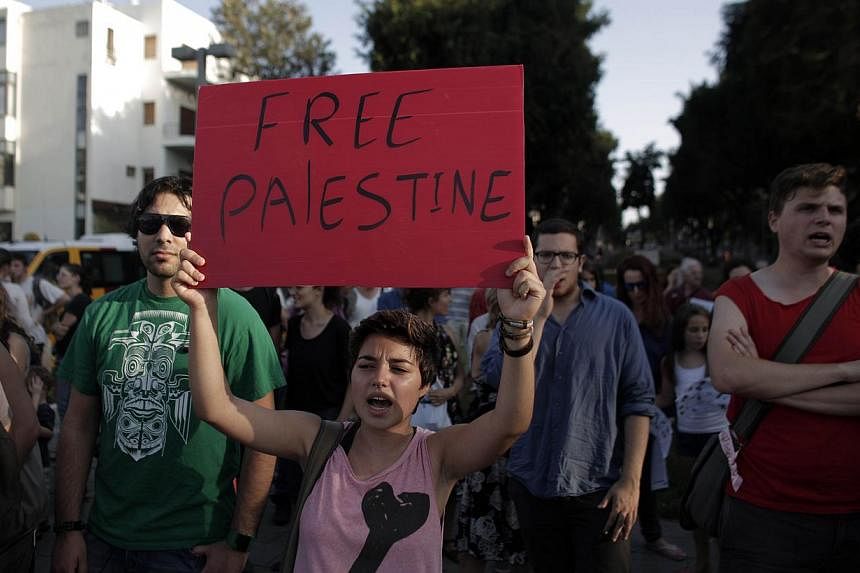Since the murders of three young Israelis and a Palestinian teenager, tensions between Israelis and Palestinians have risen to a fever pitch. United Nations Secretary General Ban Ki Moon has said the current situation "is on a knife-edge" as the UN Security Council prepares for emergency talks on the crisis on Thursday.
Here are five things about the Mideast conflict.
Why is Israel's army attacking targets in the Gaza Strip?
The Israeli army aims to stop a barrage of rockets fired from Gaza and to weaken the radical Islamic group Hamas.
In the early morning hours of July 8, the armed forces attacked about 50 sites in the Gaza Strip, apparently including homes of militant Hamas members. The Air Force also fired at rocket launching pads and training camps, a spokesman said. At least 61 Palestinians have been killed and more than 550 injured in the airstrikes, according to Palestinian medical sources and Health Ministry officials.
Earlier, Hamas took responsibility for the rocket attacks from Gaza. On July 7, the group fired dozens of rockets at Israel. The Israeli military lists about 80 rockets that hit Israeli territory up to 80 kilometres inland - further than ever before in the present conflict.
These are the worst tensions since 2012, when Israel and Hamas fought an eight-day war.
What started this new wave of violence?
While rocket attacks from Gaza and Israeli military incursions in the West Bank are regular occurrences, last month's abduction of three Israeli teens in the West Bank have brought the tensions to a fever pitch.
When the bodies of Eyal Yifrach, Gilad Shaar and Naftali Frankel were found on June 30, Israel was grief-stricken. The Israeli government blamed Hamas, which denied responsibility but praised the abductions.
Israel carried out arrests and demolished homes of the suspects in the West Bank, and launched airstrikes against targets in Gaza that are used to lob rockets into Israel.
Palestinians stepped up rocket attacks and clashed with Israeli troops.
The mood darkened further when a Palestinian teenager was abducted and killed in Jerusalem in what police say could be a revenge killing. The news sparked clashes between protesting Palestinian youths and Israeli security forces in Jerusalem.
What is the political context?
Relations between the Israeli and Palestinian governments were strained even before the murder of the three teenagers. At the end of April, the leaders of Hamas and Fatah declared plans to jointly rule the Palestinian territories.
On June 2, Palestinian President Mahmoud Abbas swore in the new unity government. The transitional government of 17 ministers consists of experts who belong to neither the moderate Fatah, headed by Mr Abbas, nor the radical Islamic Hamas.
At the same time, Mr Abbas declared that the new government would recognise signed peace treaties with Israel. Israel criticised the government, with Israeli Prime Minister Benjamin Netanyahu saying that Mr Abbas could not simultaneously make peace with Israel and Hamas, which has called for the destruction of Israel. Hamas, which controls the Gaza Strip, compared Mr Netanyahu with the terrorist network Al-Qaeda.
The region has many depressing precedents when it comes to violence. Palestinians have revolted twice against Israel's occupation of East Jerusalem, the West Bank and the Gaza Strip. Israel conquered and occupied those territories in the June 1967 war.
In late 2008 and early 2009, Israel carried out airstrikes and then a ground offensive against Hamas in Gaza that killed hundreds of Palestinians. The November 2012 Israeli offensive sparked a bloody eight-day conflict that ended in a cease-fire.
Has the crisis reached a tipping point?
The violent cycle of retribution and retaliation only seems to be worsening.
As militants fire volleys of rockets from Gaza, Israel is responding with waves of airstrikes.
As Hamas vows to make its enemy pay the price, Israel is calling up hundreds of recruits and strengthening its positions around Gaza.
Tensions between Palestinians and Israelis have always simmered in plain view, erupting periodically into deadly spasms.
"You have got politics. The blood is up. You have got retaliation," said Aaron David Miller, a Middle East expert at the Woodrow Wilson International Center for Scholars, according to CNN.
Said CNN's Fareed Zakaria: "It's difficult to see how this stops. At what point does one of the sides say, 'You know what? Let's have a moment where we make a preemptive concession, we do some kind of peace talks'. That's not in the cards right now."
How is the international community reacting?
US President Barack Obama has urged Israelis and Palestinians to find a peaceful solution to the conflict.
"Peace is possible," Mr Obama wrote in an op-ed for the Israeli newspaper Haaretz.
"When the political will exists to recommit to serious negotiations, the United States will be there, ready to do our part."
German Foreign Minister Frank-Walter Steinmeier warned of spiraling violence in the region. Of course, he said, Israel has "the right to protect its citizens from rocket attacks." He added that he hoped all parties recognise that "a military confrontation that is beyond control must be avoided."
UN chief Ban Ki Moon warned that the region "cannot afford another full-blown war".
"The deteriorating situation is leading to a downward spiral which could quickly get out of control," Mr Ban said.
"The risk of violence expanding further still is real."
He demanded that Hamas militants stop firing rockets and also urged the Israeli government to exercise restraint and respect international obligations to protect civilians.
Sources: BBC, CNN, Deutsche Welle

